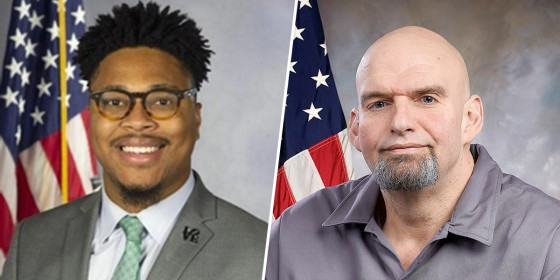BRADDOCK, Pa. — Nineteen months before a high-stakes Pennsylvania Senate election, the former mayor of this economically ravaged small town is laying claim as the favorite in a Democratic primary that is emerging as a new test of progressive muscle.
That former mayor of 14 years, John Fetterman, 51, now the state's lieutenant governor, revealed Thursday that he had raised a staggering $3.9 million in the first quarter from over 90,000 people, which his campaign called proof that he is the “clear Democratic front-runner” in the 2022 Senate contest.
A day earlier, his rival Malcolm Kenyatta, 30, a state representative from Philadelphia who is pursuing a pathbreaking candidacy to become the first Black, openly gay millennial senator, rolled out the endorsement of Chardaé Jones, who was picked by the Braddock City Council to succeed Fetterman as mayor.
The early jockeying between the two Democrats plants the seeds for what may be a long and rough campaign to replace the retiring Republican incumbent, Pat Toomey, in this quintessential swing state. It is also a test of whether progressives, who have found success in deep-blue House districts in recent years, can extend that formula to competitive Senate races after they helped vanquish former President Donald Trump.
Fetterman and Kenyatta, the two major candidates so far, are both running to pass a $15 minimum wage and Medicare for All, mitigate climate change and limit corporate influence in politics. And both want to abolish the Senate filibuster to do it. Yet even as they align with movement goals, both resist the “progressive” label, cautious not to be defined by caricatures of the term by conservatives, and with an eye to the general election if they make it that far.
“I don't know if I consider myself a progressive,” Fetterman said in a wide-ranging interview at his home here during a snowy day, insisting that his vision of a wage hike, making health care a right, and gun control is popular with voters across party lines. “These things are what everybody wants. I don't think this is radical.”
Kenyatta had a similar answer. “These get framed as, ‘This is progressive.’ But this is what is supported by the broad majority of the American people,” he said in an interview shortly after President Joe Biden spoke in Pittsburgh on Wednesday.
So far, the progressive wing has a head start over moderates, but they appear to be splitting: Fetterman has enlisted the firm Data for Progress to conduct polling, while Kenyatta has scored the endorsement of the Working Families Party. Others, like Justice Democrats, the group that recruited Rep. Alexandria Ocasio-Cortez to run for Congress, are steering clear of the race for now.
A big factor in this primary is the candidates who have yet to decide. Some strategists say the party needs a more middle-of-the-road figure to capture the seat: U.S. Reps. Conor Lamb, Madeleine Dean and Chrissy Houlahan have all been floated.
Some of them are waiting to see if their districts get carved up or eliminated in the redistricting cycle, when Pennsylvania is expected to lose one congressional seat.
“In 2022 we might answer a very important question in Pennsylvania, which could have broad implications for the progressive movement and the Democratic Party,” said a Democratic operative who was granted anonymity because their boss instructed them not to weigh in on the race. “Namely: Do Democrats need a Bob Casey-like candidate to win a federal race in Pennsylvania, or can we be successful nominating a candidate who believes in what the base believes in and looks like the base?”
Fetterman praised the House prospects as “tremendous Democrats” and welcomed any of them to jump in: “The more voices in this race, the better.”
The stakes are high, as the state's voters could decide which party controls the Senate in two years.
Fetterman and Kenyatta defy the prototype of moderate Democrats who have typically won Senate nominations in the Keystone State for decades. Republicans, who could face a messy primary of their own, are already working to portray them as too extreme.
“Campaigns are marathons, but Democrat candidates in Pennsylvania are already sprinting as far left as possible,” said Chris Hartline, a spokesman for the Senate GOP's campaign arm.
The GOP field is in a more nascent stage, with Jeff Bartos, who lost the 2018 lieutenant governor's race to Fetterman, others like former Rep. Ryan Costello and some candidates linked to Trump weighing it.
Voters here could be forgiven if they struggle to find policy distinctions between the two Democrats.
Where they exist, they tend to be subtle. For instance, Kenyatta supports calls for Biden to unilaterally cancel $50,000 in student debt; Fetterman wouldn’t put an “arbitrary” dollar figure on it. Sometimes it’s a matter of emphasis: Both support legalizing marijuana, but unlike Kenyatta, Fetterman highlights the issue with a green weed leaf on his campaign T-shirts.
Fetterman said he’d be comfortable casting the deciding vote to kill the Senate’s 60-vote threshold, doubting that a future Republican-led Senate would have the audacity to overturn liberal laws, such as protections for pre-existing conditions, with a bare majority. He also took aim at liberal boogeyman Mitch McConnell, the Republican Senate minority leader.
“My thoughts are: If Mitch McConnell is for it, I'm against it,” Fetterman said with a chuckle. “If Mitch McConnell came out for cute puppies and lazy Sundays, I would be suspicious about cute puppies and lazy Sundays immediately.”

But unlike some fellow Democrats, Fetterman promised he’d strive to work with Republicans even if they voted to block the counting of electoral votes again, like they did on Jan. 6, citing as an example Sen. Bernie Sanders, I-Vt., working with Sen. Josh Hawley, R-Mo., on direct cash payments last year.
“I’ll work with anybody that wants to do the right thing for this country. And I don't come into any situation with a chip on my shoulder,” Fetterman said, adding that it would be “silly” to red-flag colleagues. “I don't look for a fight, but I'm not afraid of one either.”
Kenyatta said he has lived through the poverty he wants to mitigate. Raised by his mother after his parents divorced early in his life, he said they moved around frequently and lived through periods without health insurance, when she rationed her insulin.
“My message is that we need, right now, to have authentic leadership. We need leaders who understand what’s broken because they’ve walked over the brokenness, because they've experienced this, because they've lifted,” Kenyatta said. “And if you look at the Senate right now, ask yourself: Do you want an actual working person in that body?”
Fetterman and Kenyatta had nothing but praise for Biden, who carried Pennsylvania last fall.
Both men will face their share of political struggles.
Kenyatta has little name recognition outside Philadelphia, and may struggle to garner it quickly if the race gets crowded. He has not revealed his first quarter fundraising numbers. Solidifying the Black vote would make him formidable, but he's far from achieving that. Some Democrats privately wonder if a state with a habit of picking white men for statewide office would elect a gay Black man.
Fetterman is from Allegheny County in the west, and it's unclear if his national brand will pave enough inroads into the Philadelphia area, where the bulk of the Democratic vote will come from. He also can't seem to escape questions about his appearance — at 6’8”, bearded and sporting tattoos on his arms, Fetterman doesn’t look like the average senator.
The lieutenant governor recently addressed an incident in 2013 in which he wielded a gun to stop a Black jogger after hearing a “crushing burst of gunfire” and saw a man, who he said was dressed entirely in black and a face mask, and thought he was involved.
Asked about it on Thursday, Fetterman, who had his young son with him at the time, insisted that race played no role in his decisions at the time.
“Absolutely, at no point, was I even aware of the individual's race,” he said. “I've spoken on it extensively. And everything about that is out there, and voters and people are going to be able to make up their own minds on that. But I have a 26-year unimpeachable record on working to advance the core values and issues of these marginalized communities and individuals.”

